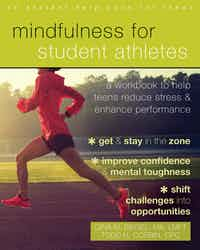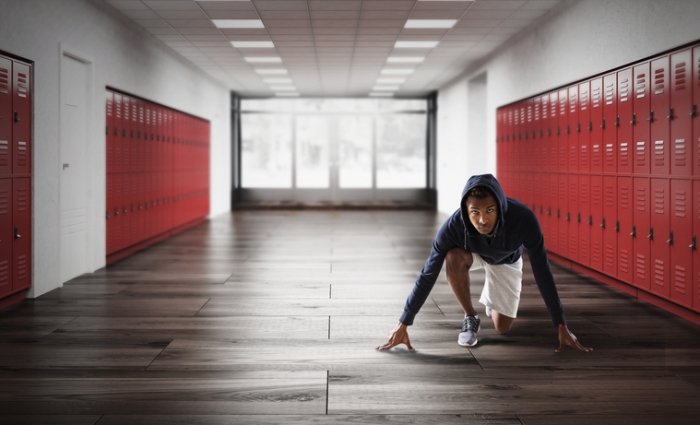By Gina M. Biegel, MA, LMFT, and Todd H. Corbin, CPC
Every new school year, teens around the world get a fresh start—new teachers, new locker assignments, and a clean slate with their grades. You might also get to start the year off with a new backpack, a fresh pair of shoes or cleats, but what about rebooting your mind and body? How do you begin anew without those old worries, judgments, and self-doubts keeping you down? You can offer yourself a fresh start, a mental clean slate. You can get rid of whatever might be holding you back.
Mental Locker
Consider your mind as a mental locker. It stores a lot of things: the good, the bad, and the ugly. Sometimes what gets stored in your mind gets left and forgotten about—like old gym clothes, or notes that fall through the cracks of the shelves. Each year you get a clean locker at school. The same can be true for your mind. You have the power and control to keep those thoughts which serve you—the positive, pleasant, and upbeat points of view; and leave those thoughts which don’t serve you, that drain or deplete you—the negative, unpleasant, and harmful thoughts, to the curb.
What is in your mental locker right now? Think about the people, places, things, or situations from your past that might be negatively impacting you from starting the school year with a fresh start. For example, an ex who you will see when the school year starts, and you are worried what he or she might say to others about you. Or you think your old math teacher talked about you to your new math teacher. What is still lingering in your mental locker? Take a piece of paper and write down all the people, places, things, and situations that aren’t supporting your mental health and well-being. Once you have written these things down, consider letting them go. You can throw this list out, you can shred it, or cut it into many pieces. Just because you think something, doesn’t mean it is true or that you must keep giving it continued brain time. Work to let go of the people, places, things, and situations that aren’t helping you. Right now, there might be some items on your list still lingering that are particularly difficult to let go of. These can weigh you down. What can you do about these lingering stumbling blocks?
Nip It in the Bud
As the old saying goes, “Nip it in the bud.” Once you are aware of those thoughts—and people, places, things, or situations that are holding you back—you can nip them in the bud before they impact your new school year and adversely affect your sports and academic performance.
Work to NIP your negative thoughts in the bud by using NIP: Notice your thoughts; Identify the thoughts as negative, positive, or neutral; and Place negative thoughts to the wayside by focusing on the positive. In this way, you NIP your negative thoughts in the bud before they start creeping into other areas of your life.
Mental Toughness and Mental Confidence
From time to time, some of those older negative thoughts can sink so deep, they may become more difficult to NIP in the bud, like getting used gum off the bottom of your shoe. And what happens if you walk around with gum on your shoe? It usually attracts additional debris and unwanted junk—more negative thoughts. This is where increasing your overall mental toughness can help. Mental toughness is your ability to overcome doubts, worries, and obstacles that can get in the way of your success. Mental toughness helps propel you past those negative thoughts, people, places, things, and situations that are holding you back. In turn, you can feel more confident, resilient, and successful.
Mental confidence is having the belief in your skills and abilities about yourself, someone, or something. Your thinking plays a large role in your success as a student, athlete, and life in general. Your confidence helps you to do well in class, on an exam, or having the self-assurance that is necessary to successfully play a sport. Increasing your mental toughness and confidence will go a long way to support your overall well-being on and off the athletic field. For example, they can help you successfully navigate your way through a very tough AP course or manage a difficult situation with a teacher, coach, or boss. If you do poorly on an exam or make a mistake at work or during a game, can you muster the mental toughness and confidence needed to try again with a positive attitude? When the going gets tough, do you barely survive, or do you thrive?
Positive Self-Talk
You can increase your level of toughness and confidence by using a proven tool called positive self-talk. Positive self-talk is sometimes communicated through mantras. Mantras are short, positive statements like, “I can do this!” or “I will make the next play.” When you talk to yourself in a caring and assured way, you can feel more confident and build more confidence in your mind and body. When you engage in positive self-talk, either silently or out loud, you are actively choosing to support and nurture your mental toughness and confidence. Positive self-talk is a way to SPEAK to yourself in a kind and motivational way. Follow these five keys below to engage in positive self-talk using SPEAK.
S: Use SHORT phrases to make it easy to remember like “Run Strong” or “Next One.”
P: POSITIVE and PRESENT-BASED phrases like “I got this” or “Swing Smoothly.”
E: ENGAGE in and use your phrases before an actual game or as the need arises.
A: Have some ALTERNATIVES to choose from to keep self-talk fresh and relevant.
K: KEEP picturing positive connections forming in your brain when you use your self-talk.
Game-Time Mindful Takeaway
Remember to: (1) keep your mental locker clean, (2) NIP those negative thoughts in the bud, (3) be mentally tough and confident, and (4) use positive self-talk to SPEAK to yourself in kind and confident ways.
Download worksheets to get in the zone for the new school year here.
 Gina M. Biegel, MA, LMFT, is a psychotherapist, researcher, speaker, and author of Be Mindful and Stress Less. Visit www.stressedteens.com for more.
Gina M. Biegel, MA, LMFT, is a psychotherapist, researcher, speaker, and author of Be Mindful and Stress Less. Visit www.stressedteens.com for more.
Todd H. Corbin, CPC, is an avid runner, sports enthusiast, mindfulness teacher,motivational speaker, and certified parenting coach. Visit www.toddcorbin.com for more.


 2024 Peace Playbook: 3 Tactics to Avoid Clashes with Your Partner
2024 Peace Playbook: 3 Tactics to Avoid Clashes with Your Partner